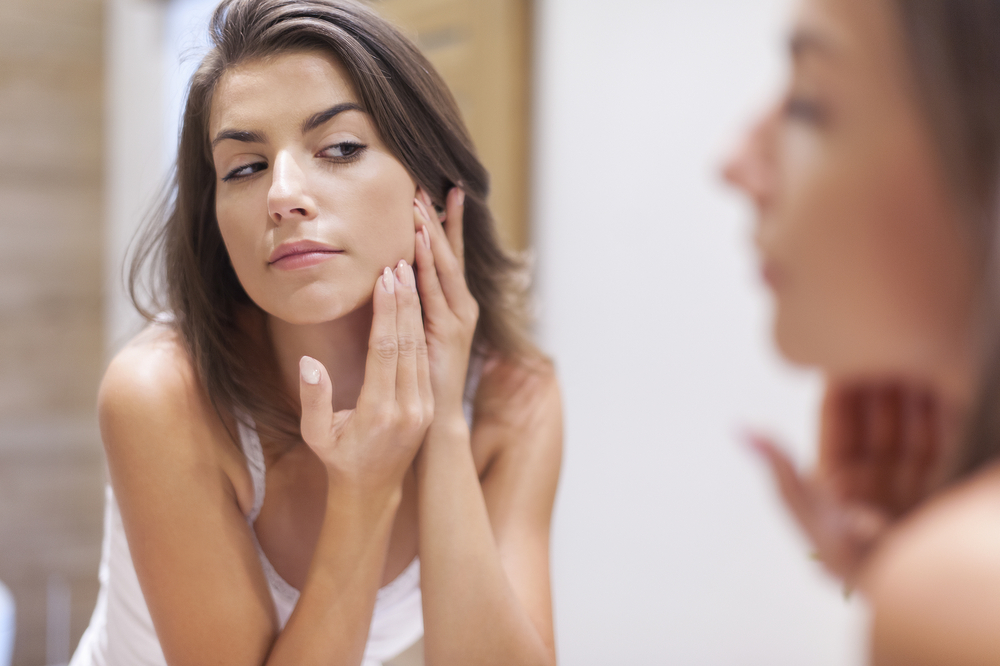
Acne is one of the most common skin conditions I encounter in my clinics. It affects up to 80% of the population at some point in time and there is no doubt that frequent breakouts can leave you looking and feeling miserable. Getting your skincare right if you suffer with oily or acne-prone skin is vital.
Acne develops due to a combination of factors. It is a disorder of the pilosebaceous unit of the skin, which is composed of an oil-producing gland, hair follicle and hair. After puberty, the size and activity of the oil-producing glands increase. Skin cells or keratinocytes become “sticky”, blocking pores, and bacteria known as P. acnes multiply in this environment. This can initially manifest as blackheads or whiteheads (comedones). If the skin inflammation is very deep, then painful red lumps or cysts may appear. These can cause permanent scarring of the skin.
Acne has historically been thought of as a teenage skin disorder, but over the past decade, outpatient consultations are also increasing in adults that suffer with the condition. Adult acne is more common in women and consists of two subtypes: persistent acne (acne that continues from teenage years and fails to clear) and late-onset acne (first beginning after the age of 25 years). Acne in women can be particularly sensitive to hormonal changes during the menstrual cycle and many women find their skin worsening during the pre-menstrual period. There will often be a family history of acne if it develops after adolescence.
Lifestyle factors
There is emerging scientific data showing that consumption of foods with a high glycaemic index (GI) and certain dairy products (in particular, low-fat milk) can aggravate acne. These foods are rapidly absorbed by the body and result in raised blood sugar or glucose levels. Raised circulating blood glucose levels promote the release of the hormones insulin and insulin-like growth factor 1 (IGF-1). Both of these increase oil or sebum production and act on the body to produce more male hormones known as androgens (both men and women have androgens). All these factors together are thought to promote the development of acne. Therefore, in some individuals, it may help to limit these types of food.
Anecdotally, stress can aggravate many chronic inflammatory skin diseases, including acne, so finding methods of reducing this, e.g. through exercise or meditation, may indirectly have some benefit.
Skincare
It is important to cleanse the skin twice a day – morning and evening. This can be in the form of a rinse-off cleanser or micellar water. Choose a cleanser specially formulated for blemish-prone skin. These products often contain salicylic acid, zinc, or benzoyl peroxide.
After cleansing, use a light gel-based moisturiser that is “non-comedogenic”, i.e. prevents the formation of blackheads. Even oily skin needs moisturising as oils do not equate to hydration. Moisturising the skin will maintain the barrier function of the skin and is vital for good skin health.
Exfoliating the skin once a week is advisable, as this will immediately remove dead skin cells from the skin surface resulting in brighter appearance of the skin. Longer term, it will reduce the development of blackheads. It is important not to overdo this step, otherwise you will end up irritating the skin.
Finally, use a prescribed retinoid product on the skin at night before bed. This will help unclog pores, reduce the formation of blackheads and whiteheads, and calm inflammation.
Make-up
Many people are incorrectly told to avoid wearing make-up if they have acne. Acne can cause profound effects on self-esteem leading people to feel extremely embarrassed or socially anxious about their skin. There is no need to avoid make-up if you have acne and many people choose to conceal their spots as it provides self-confidence. It is, however, important to choose the right cosmetic products. If you wear make-up, then opt for oil-free foundations or BB creams that will provide the coverage you need.
What to avoid
Do NOT pick, scratch, or squeeze your spots. These all lead to skin damage and can potentially result in permanent pigmentation marks or scarring of the skin. It is better to apply a spot-directed treatment directly to the area, such as salicylic acid, tea-tree oil or prescribed agents such as benzoyl peroxide or retinoid. These will dry up the spot and settle inflammation.
When should you see a doctor?
If your acne is persistent, causing scarring, or stopping you from living your life the way you want then it is time to seek medical attention from your family doctor or dermatologist. Someone with “mild” acne that is suffering with low self-esteem should be taken just as seriously as an individual with more “severe” disease that is relatively untroubled.
General measures such as skincare advice and topical creams on the skin are usually tried first. If these fail, then there are a large number of treatments that can be tried including steam facials, chemical peels, laser, oral antibiotics, hormonal agents, isotretinoin, and light therapies. A dermatologist will be able to discuss all of these options with you in detail and cater treatment to you.
Quick fixes
If you suddenly develop a large, stubborn, solitary acne cyst before an important social event (e.g. a wedding, photoshoot, important meeting) it is possible to inject deep spots with steroid. This results in flattening of the cyst within 42-72 hours and should only be done under the guidance of a dermatologist as there are potential risks associated with the procedure. This method should not be used on a regular basis, but is extremely effective if a rapid response is required.
Some final words
Acne therapies and our understanding of this common condition are increasing, as are the different modalities of treatment. Your skin should never be the limiting factor in your life. No one should have to live with acne as there are effective treatments producing consistent, reliable end results. Treated acne is life changing for those that have suffered with it. A dermatologist would be happy to discuss your treatment options as their end goal is the same as yours – to provide you with the skin you have always wanted.
